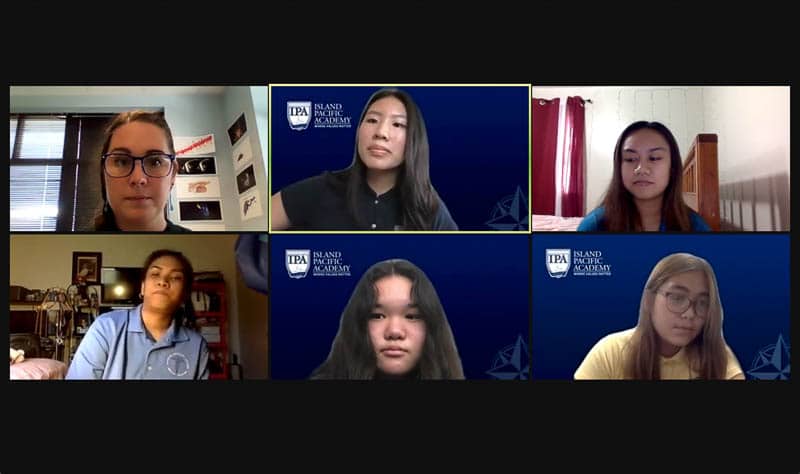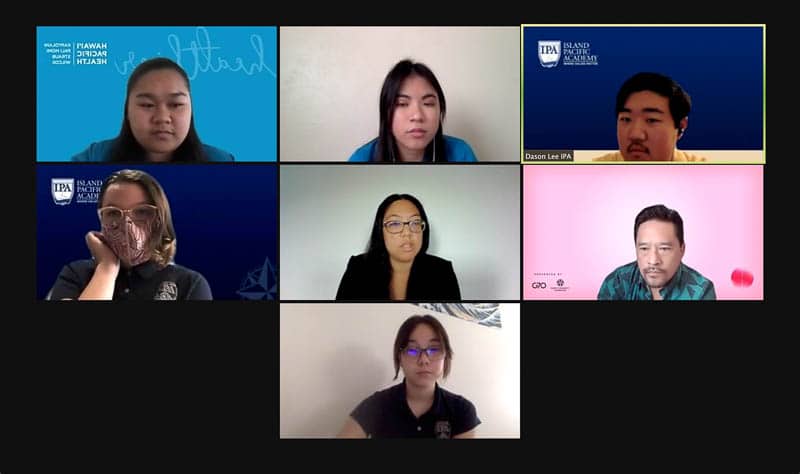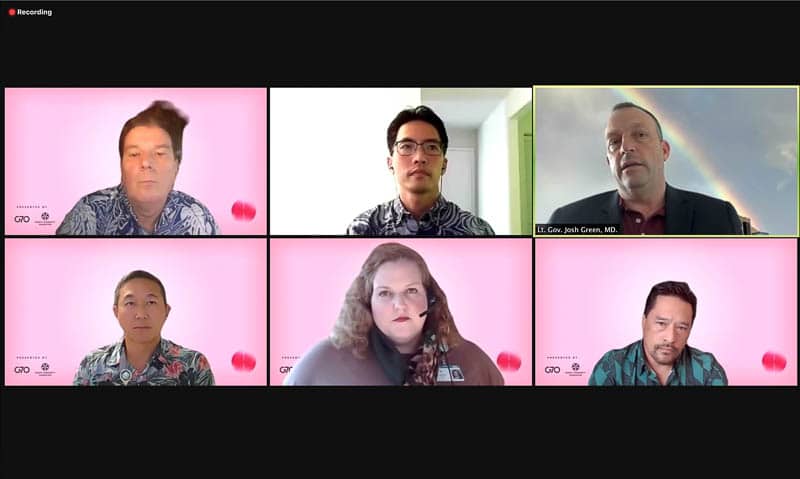The topics of mental health and the COVID-19 vaccine were foremost on the minds of the student participants in Hawai’i Business Magazine’s CHANGE Event Series on Health and Wellness on Thursday, March 18, 2021, with students wondering about whether mental health during the pandemic has been prioritized as much as it should be, and how the vaccine will affect teenagers.
ISLAND PACIFIC ACADEMY is a Student Sponsor of the six-part series, which gives IPA students the opportunity to participate in a student prep session before each event. Prior to the prep session, students are provided background information on the topic and the panelists, who are community leaders in their fields. During the prep session, students have a chance to meet some of the panelists and participate in small group discussions about the given topic where they formulate questions to ask of the panelists during the main event.
Eight IPA students in Grades 9 through 11 were joined by students from the Medical Assistants program at Kapi’olani Community College for the second event in the series, covering the topic of Health & Wellness. More than a quarter of the questions from the students dealt with the effects of the pandemic on mental health – the effects on child development, the age group most affected in terms of mental and emotional health, programs to bring awareness to mental health issues, and whether or not the issue has received as much attention as it should.
Students are living through this pandemic during the most formative period of their lives, when peer interactions are so critical to their emotional and social development. So it is not surprising that the restrictions brought on by the pandemic have had a major impact on them and would be one of their foremost concerns.
“Things were especially tough for me at the beginning of the pandemic because of how rapidly things had changed,” shared Ryan McMann ‘23. “Although it never became ‘easy’, over time I started feeling a lot better because of the strong support system I have, which I feel very grateful for.”
“It was also very tough because both my parents are physicians who see numerous patients on a daily basis, meaning every time they came home, they would have to make sure they’re disinfected and potentially have to quarantine if they ran into patients with COVID like systems.”
For Dason Lee ‘23, it may be what is to come that is more concerning. “In some ways, the future is the scarier part of the pandemic,” he explains. “Even after all the necessary precautions are taken to return to a ‘normal’ life the resulting changes in mental health are hard to deal with. There is certainty with COVID; since it’s a physical condition it has defined stages and conditions that can be tracked with enough research. However, mental health is typically a lot harder as it all depends on having people open up which isn’t a guarantee and what makes mental health programs necessary for multiple age groups.”
The social isolation has been difficult for all the students. “I don’t get to see people at school in person and I only get to see them over Zoom,” shared Karena Meyermann ‘23. “I was glad to hear from the panelists about how kids’ mental health is being cared for during the pandemic.”
Questions about the COVID-19 vaccine focused on how effective it is and how the distribution process is working. Many were interested to hear about the potential side-effects of the vaccine, how it will affect their age group in particular, and how to address the issue of vaccine hesitancy.
“One thing I took away was the importance of empathy in working collaboratively and cooperatively with others,” shared McMann. “Dr. Kozak’s response to the question of how to encourage skeptics that the vaccine is safe really brought a new perspective and approach I hadn’t thought of before – to ask them specifically what about the vaccine they feel unsafe about and to try and empathize and explain in a respectful manner how that specific aspect of the vaccine is actually safe. Looking at it from a different perspective really enlightened me to how the approach of empathy not only makes sense for the COVID vaccine, but also how it is applicable in other aspects of life.”
Overall, the students agreed that participating in the discussions and hearing from the panelists gave them a broader perspective of the current health and wellness issues facing the communities in Hawai’i. And seeing how the community has come together under the guidance of these community leaders to address these issues provided inspiration.
“The community leader in my discussion group helped to build on our questions and helped encourage us,” shared Lee. “A part of being a leader is building people up and that’s something to take inspiration from.”
Participating in the event were Dason Lee ‘23, Ryan McMann ‘23, Karenna Meyermann ‘23, Rhianna Hara ‘24, Ashley Arakawa ‘24, Cecilia Kelly ‘24, Taylor Mizon, ‘24, and Kristin Chun, ‘22. Also taking part from IPA were Gerald Teramae, Dr. Brandy Sato, Katie Keohohou, and Be-Jay Kodama. There will be four more events in the coming months, with the opportunity for more IPA students to participate.
Event panelists, included Lt. Gov. Josh Green, M.D., Lieutenant Governor, State of Hawai’i and Physician, Kohala Hospital, Hawaii Island;Dr. Kathleen Kozak, M.D., Medical Director, UHA Health Insurance and Physician, Straub Clinic and Hospital; Jason Chang, Executive VP and Chief Operating Officer, The Queen’s Health Systems and President, The Queen’s Medical Center; Mason K. Chock, Council Vice Chair, Kaua‘i County; and Dr. Brian Wu, M.D., Medical Director, HMSA and Physician, Kapi‘olani Medical Center for Women & Children. The event was moderated by Steve Petranik, Editor, Hawaiʻi Business Magazine.





